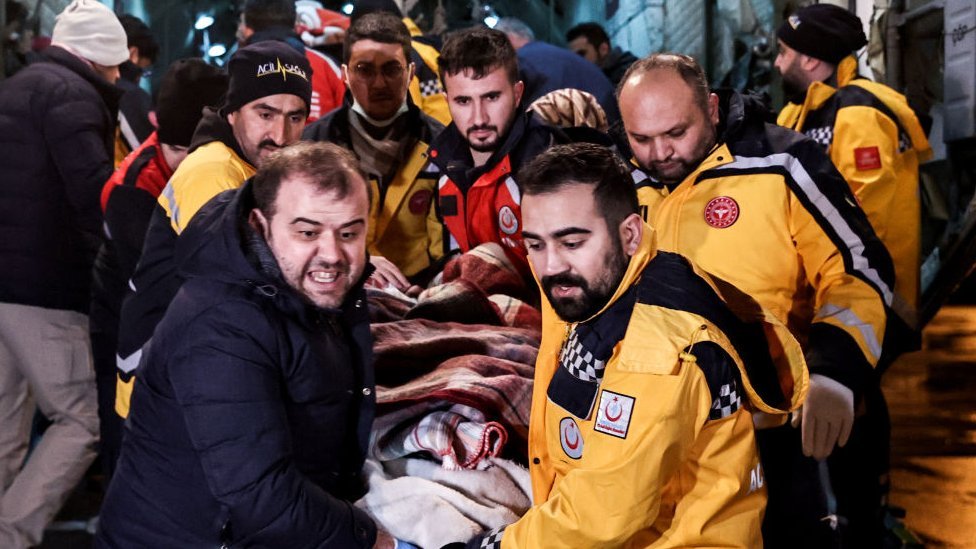Medical teams take wounded civilians to hospital in Istanbul
Aid is ramping up in southern Turkey and northern Syria after a massive earthquake devastated the region and killed more than 7,000 people.
The 7.8-magnitude tremor struck near Gaziantep, Turkey, in the early hours of Monday morning and reduced apartment blocks to rubble at a time when most were asleep.
It is a region that has not seen a major earthquake or any warning signs for more than 200 years.
National governments of many countries including the UK, US, China and Russia are providing assistance, including search and rescue experts.
And many charities are also launching appeals and sending teams to the area.
The British Red Cross was one of the first major UK charities to launch its appeal.
Working with the Turkish Red Crescent and the Syrian Arab Red Crescent, it is already on the ground to “provide urgent support during these critical hours” and bring people to safety.
Many of those injured have lost their homes and all their belongings, surviving in the frost or rain with little shelter or food.
The natural disaster took lives and injured more than 15,000 people in Turkey alone
Oxfam is another major charity that has launched an appeal.
It said it will focus on providing “shelter, water and sanitation, shelter and food” while assessing people’s longer-term needs after so much destruction.
His spokeswoman in Ankara, Meryem Aslan, said local people were “shocked” and struggling to cope “after two major earthquakes and over 60 aftershocks”.
“The extent of the destruction is enormous. People are still in shock and afraid, they don’t even have time to mourn the lost,” she said.
Turkish and Syrian communities in the UK – many seeking information on missing loved ones – have started their own local fundraisers – many using Facebook to reach out to volunteers and donors.
A spokesman for the British Turkish Association, based in Luton, said the reaction from “all communities” in London had been “emotional”.
Atilla Ustun, 55, also chairman of the Luton-Turkish Community Association, spoke to the PA news agency from Heathrow as he helped load a Turkish Airlines cargo plane with more than 300 boxes of donated clothing, medical supplies and baby supplies.
“All the communities in Luton and the surrounding area have swarmed out to donate… Just locally, in Luton itself, we’ve raised around £20,000,” he said, “but we know that in general, I think in London, now between £ is 200,000 and 300,000.”
Ali Topaloglu, from Nottingham Turkish Municipality, is part of a campaign asking for donations of tents, blankets and clothing for Turkey, as well as money for food parcels.
“The Cold Will Kill”
The earthquake-hit region is home to millions of refugees displaced by Syria’s civil war, with northern areas still mired in conflict.
It has already been an important hub for NGOs (non-governmental organizations) and charities – many of whom have been working there for years, providing cross-border assistance to people displaced by war.
Organizations such as Save the Children, Unicef and Médecins Sans Frontières (Doctors Without Borders) all launched appeals in the wake of the earthquake.
MSF provided immediate support to 23 health facilities in Idlib and Aleppo, northwest Syria, where hospitals and clinics are “overwhelmed” and access to the war-torn region can be difficult for outside medical staff.
The charity is providing emergency medical equipment and staff to reinforce local health teams who are “working around the clock to respond to the large number of wounded”.
“Needs are very high in north-west Syria as this quake adds a dramatic layer for vulnerable populations who are still struggling after many years of war,” said Sebastien Gay, MSF Syria Director.
Save the Children said it has spent a lot of time reviewing needs and checking what is working logistically.
James Denselow, UK Head of Conflicts and Humanitarian Advocacy, said: “Providing shelter is the most urgent type of relief from our perspective because the cold will kill people in less spectacular ways than the earthquake, but just as deadly.”
He said with airports down and hospitals and clinics collapsing, “all the places that we would normally use aren’t necessarily accessible.”
He added that the aid route to northern Syria has remained inadequate.
“Northern Syria is an area where we were dealing with severe malnutrition and far greater humanitarian needs than other settings before this happened,” he said.
“If you’re a vulnerable demographic and then something similar happens, what happens to you is likely to be a lot worse.
“We see that in very basic things like children’s physiology. A child’s ability to survive an accidental injury from a falling building on them is severely reduced when they are malnourished.”
He added: “This will be about getting blankets, food, clean water and education kits – so kids don’t find their studies totally ruined by this – for them.
“We’ve got to keep these people warm, we’ve got to keep toddlers warm.”
David Wightwick, CEO of UK-Med medical aid charity, said his team is heading to Turkey to identify where their help is most needed before mobilizing their registry of hundreds of NHS medics.
“You can imagine that in an area, the size affected and the numbers affected is not necessarily an easy decision to make,” he told BBC Radio 4 Today.
Typically, the larger humanitarian organizations do not ask for donations of blankets or clothing – they prefer money.
“What people are giving today may not be what people need tomorrow,” notes Oxfam, highlighting delays in helping victims due to delivery times from the UK.
“Our approach is to work with local organizations and communities on the ground, rather than sending blankets, clothes and other donated goods from the UK,” said the charity’s humanitarian director, Magnus Corfixen.
“During emergencies, we often do cash distributions because it’s quicker, allows people to get what they need most, and also helps the local economy recover. From our years of experience, we have found that cash not only gives people choices, but also helps to maintain their dignity.”
Don’t miss interesting posts on Famousbio










